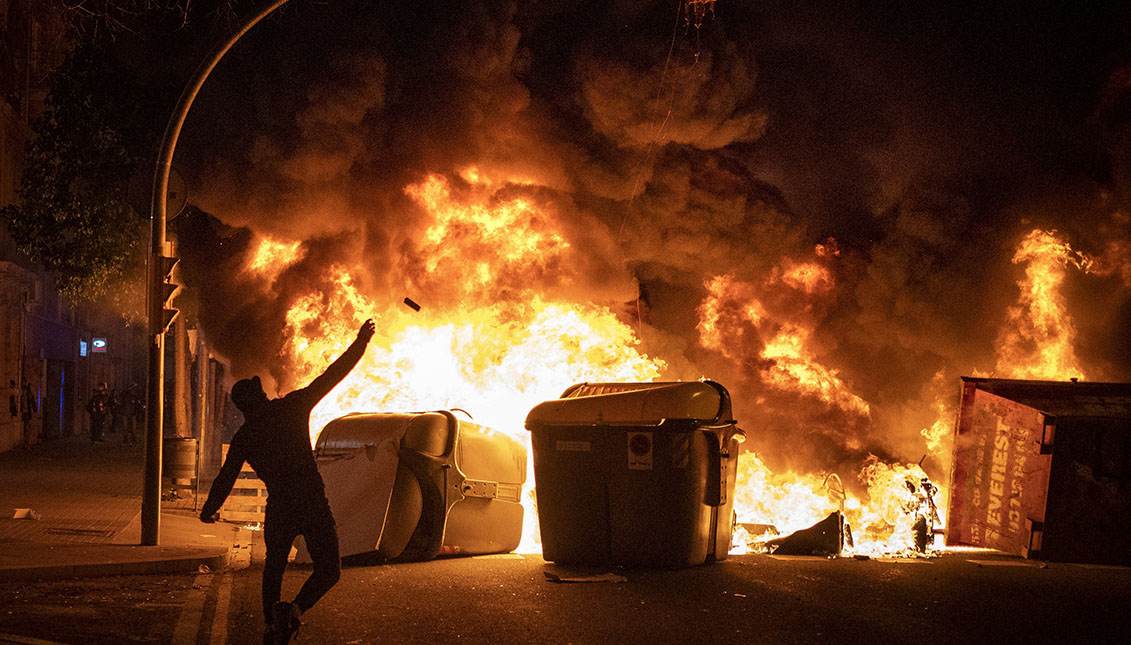
The streets of Spain burn for the third night in a row after the arrest of rapper Pablo Hasel
A hundred injured, more than 80 arrests, and numerous police stations and media outlets vandalized polarize the country and bring to light its many social and…
Last February 16, AL DÍA News reported how the arrest of Spanish rapper Pablo Hásel, accused of insulting the Spanish monarchy and praising terrorist violence in his lyrics and on social media, had provoked a wave of indignation and demonstrations in the country against his 9-month prison sentence.
Three days later, the riots in the streets of Spain continue fiercely and have already resulted in more than 80 arrests, raided police stations and even media outlets, such as the well-known Barcelona daily El Periódico, vandalized by hordes of Hasél's supporters.
But there are also a hundred injured, among them a young demonstrator from Barcelona who lost an eye last Tuesday after being hit by a foam projectile from Catalonia's autonomous police, the Mossos de Esquadra. An internal investigation has already been opened to clarify the police aggression.
Ferit greu, a la tercera nit d’aldarulls a Barcelona a causa de l’empresonament del raper Pablo Hasél. pic.twitter.com/LfrFRrTuF7
— Segraam (@Segraaam) February 18, 2021
Both the rapper's arrest and the altercations have provoked a harsh debate on the limits of freedom of expression. Hasél is not the first rapper brought to trial for "glorifying" terrorism; in 2018, rapper Valtònyc had to flee to Belgium to avoid his trial for a similar reason.
Also on the table has been the indiscriminate use of violence by both the police and Hasél's supporters, something that seems to have further divided the government of President Pedro Sánchez, formed by a left-wing coalition: the Spanish Socialist Party (PSOE) — to which Sánchez belongs — and a somewhat more radical left-wing Unidos Podemos.
Although both parties have agreed to modify the penal code to eliminate prison sentences for crimes related to freedom of expression, and although Podemos presented on Thursday a request for a "total pardon" for Hasél and Valtònyc, several members of the Government, such as Vice President Carmen Calvo (PSOE), criticize that Podemos has sided with those producing the riots and referred to them as "anti-fascist demonstrators fighting for the freedom of expression."
Hasél, who was arrested last Tuesday, was sentenced to 9 months in prison, six years of disqualification, and a 30,000 euros fine for "insults" to the Crown in his songs and his Twitter — in 2014, the rapper was already sentenced for the content of 12 songs uploaded to YouTube that included phrases such as "He deserves to blow up Patxi López's car!" (a socialist politician from the Basque Country, in northern Spain) or "someone stick an ice ax in José Bono's head" (another socialist politician).
RELATED CONTENT
He has also been sentenced to two and a half years for threatening a witness in a trial against some policemen in the town of Lleida, where the rapper is from.
Brutalidad policial en la manifestación en Valencia por la libertad del rapero Pablo Hasel. pic.twitter.com/R45dJy7TW9
— Fonsi Loaiza (@FonsiLoaiza) February 18, 2021
While it is true that the Spanish Constitution protects and defends the right of every citizen to freely express their thoughts and opinions through any media, the country lived in the shadow of the horror of the terrorist organization ETA for 43 years until the cessation of armed violence and the beginning of dialogue in 2011. Those dark decades left more than 800 fatal victims. The responsibility of artists with the messages they spread must be put in balance.
However, the arrest of Hasél and the riots' fury have brought to the surface the discontent and weariness of young people about the situation the country is going through. With the highest youth unemployment rate in Europe in 2020 — almost twenty points above the average —, the pandemic lockdown, and the hunger queues, not surprisingly, social discontent is led by young people between the ages of 18 and 25, as El Periódico de Catalunya pointed out.
Thus, the political tension in Spain appears to be a ticking time bomb, with the rise of the far-right VOX party, the so-called Catalan Procés — the trial and imprisonment of Catalan pro-independence leaders in 2019 — and the police violence in response to civil protests.
Can the arrest of a rapper shake an entire country?
With a weakened government and in the midst of a health, economic and social crisis, the lack of dialogue and political closed-mindedness could once again threaten an already wounded democracy, as shown by the fact that in the recent Catalan elections, 22% of the population did not go to the polls.
What is dangerous is not the messages of Pablo Hasél — a rapper is a rapper—, but the fact that the opportunity to make a critical reading of these protests, of the anger, of the discontent is lost... From everything that goes wrong in Spain, including the right to raise one's voice.











LEAVE A COMMENT: